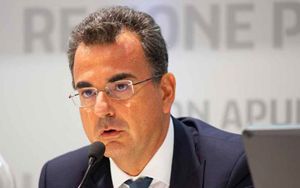(Finance) – “Managing the entry into force of the CSRD (Corporate Sustainability Reporting Directive) certainly constitutes one of the main priorities of the moment. The European Commission has also significantly modified the ESRS (European Sustainability Reporting Standards) of the first draft delegated act put up for consultation on June 9. From the perspective of our profession, highlighted in the feedback from the International Federation of Accountants, Accountancy Europe and Accounting for Sustainability, there is still a gap that separates this version from the best solution to be pursued”. This is what was stated by president of the Elbano de Nuccio accountantsin his speech on the second day of the “Meditari accountancy research conference 2023”, held in Veronaorganized by the Management department of the University of the Venetian city with the National Council of Accountants.
“The Commission – he underlined De Nuccio – has chosen to grant maximum flexibility in the adoption of the methodology for determining materiality. But the most questionable choice of the commission is perhaps the provision of the obligation of a detailed explanation of the materiality assessment, now limited only to the case of a negative outcome of the materiality assessment on the application of the Esrs E1 Climate changes”. According to the number one in the category “it will now be up to the profession to support companies in the application of the ESRS and in resolving the problems that will emerge especially with respect to the key concepts of double materiality and value chain, from whose interpretation the correct adoption of the other standards derives”.
“The change towards a more complete public dimension of the profession – continued De Nuccio – must lead us towards a new and more current interpretation of the concept of accountability, in an ethical dimension which I consider the foundation of the European approach to standard setting in ESRS and, also, the “tool” to develop the ESRS and IFRS Sustainability Dislcosure Standards in the perspective of coherence and interoperability”.
In his speech, De Nuccio also presented the‘Sustainability Observatory of the National Council of Accountants, “a new tool – he explained – to delve into issues of professional and corporate practice in the sustainability sector. The Observatory – continued De Nuccio – will liaise with ministerial offices, trade associations and economic organizations, based on the sustainability issues generated by regulatory provisions or contingent critical issues. On a regulatory level, it will carry out monitoring focused on acts involving professionals and businesses. In this area, the Observatory is already collaborating with the competent institutions for the purposes of implementing the CSRD, for example, with the participation of its resources in the Sustainable Finance Table established at the MEF, and intends to do so in the future for the application of the ESRS, especially in terms of recognizing the role of auditor/assessor of sustainability information”. The Observatory will also operate on a training level, both basic and specialist.
He also spoke at the conference Gianluca Galletti, national councilor of accountants delegated for sustainable development who, in a passage of his report, raised the question of the impact that artificial intelligence could also have in this field. “Since we don’t know its nature well – he argued Galletti – we cannot divert our attention from the artificial intelligence sector, and from its rapid entry into the lives of each of us. What impact will it have on the practice of the profession in the near future, on its skills, on the organization of studies, on their equipment in terms of software and know-how necessary for its use and management? We don’t know it yet, but for sure – he concluded – we will always need the ability to carry out, detect and understand the transition from the phenomenon (geopolitical, social, economic) to the economic-financial information to be made available: in the transition from the ESG phenomenon to the financial, economic-accounting skills will be, here too, among the requirements for verifying the adequate implementation of the control system and for the correct interpretation of that information for the benefit of operators and citizens”.
